EdChoice Public Opinion Tracker: Black Parents – February 2023
The education effort during COVID-19 will be forever engrained in the minds of many. The aftermath too, as the National Assessment for Educational Progress (NAEP) revealed sobering data about drastic learning loss that occurred. As a result, steering K-12 education back on track became a national priority. Education was, without a doubt, one of the most powerful tests for candidates in 2022 midterm elections. What lessons did we learn? How will we help children recover decades of progress that was lost? Since then, swift action has followed. States and lawmakers across the country have proceeded with urgency, listening to parents now more than ever before. Despite all the progress made this year, there is plenty left unsolved. With this understanding in mind, it becomes even more paramount to continue listening and asking questions of different groups and policies within K-12 education.
One of the groups we are fortunate enough to hear and learn from is Black parents. In partnership with Morning Consult, EdChoice surveyed a national sample of Black school parents (N=1,311) from January 23rd – February 7th, 2023. In this report we gauged Black Parents’ views on the direction of K-12 education, decision making around curriculum, microschools, and plenty more. The full report can be found here. Here are my key takeaways:
1. More than half of Black parents believe K-12 education is headed in the right direction in their local school district and state. Black parents are much more likely to be optimistic about K-12 education in their local school district (57%) and their state (55%) compared to K-12 education nationwide (41%). For reference, we see much lower levels of optimism in our polling of the general population. In February, only 45 percent of school parents and 32 percent of Americans were optimistic about the direction of K-12 education in their state.
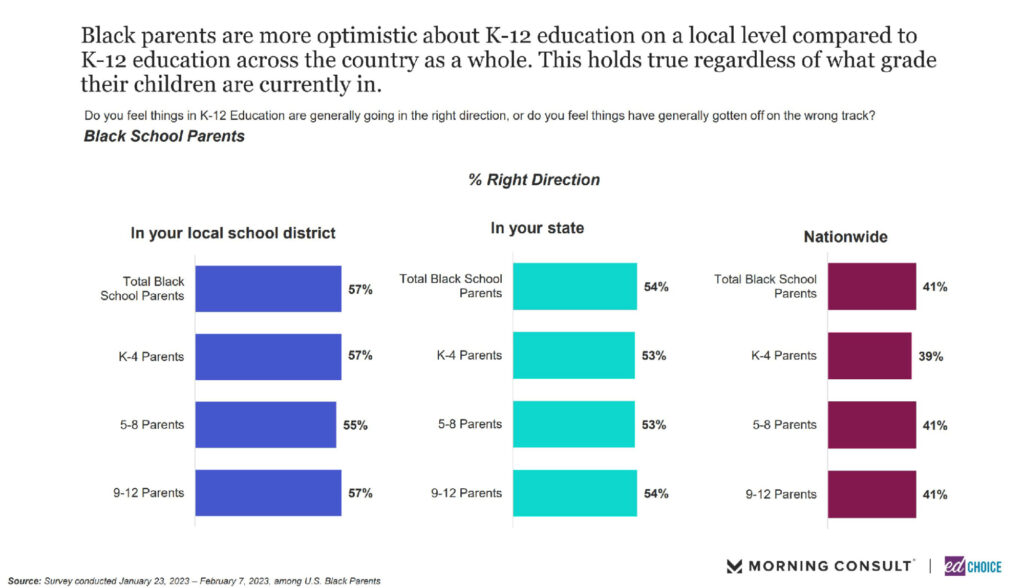
2. Black parents are most likely to say parents and teachers should have a say in their child’s curriculum. When asked who should have a say in their child’s curriculum, parents (72%) and teachers (60%) were the two most popular answers by a wide margin. The third most popular choice, school administrators, was only selected by 28 percent of Black parents. The least popular answers for who should have a say in their child’s curriculum were the federal government (6%) and religious organizations (5%).
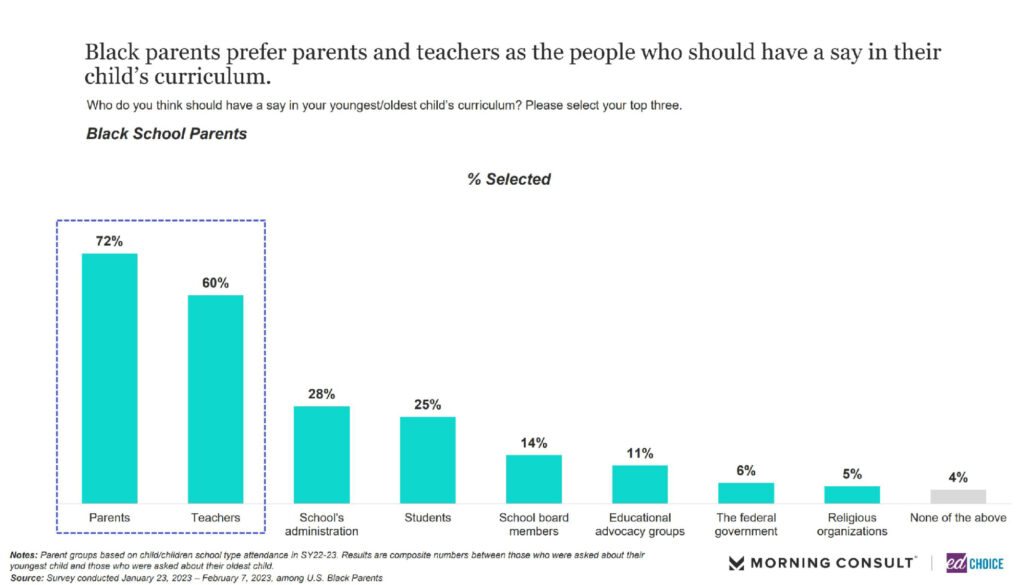
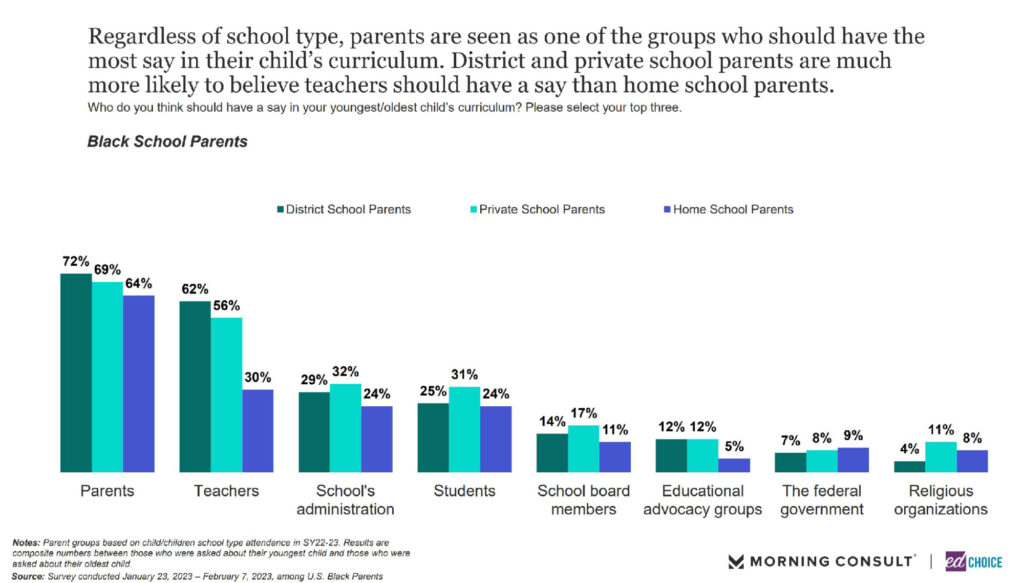
3. Black parents believe encouraging their child to ask questions and participate is the best way to get their child engaged in learning. We asked Black parents what they believe are the best ways to get their children engaged in learning. More than half of black parents believe encouraging their child to ask questions and participate, allowing them to express themselves, and socializing/working with peers can help their child get engaged in learning. When asked to narrow down and identify the best way to obtain engagement from their child, encouraging the child to participate (21%), making lessons relevant to the child’s personal life (15%), and offering rewards/incentives (12%) were the top choices. Black parents were the least enthused about encouraging competition among peers (3%) as the best way to get their child engaged in learning.
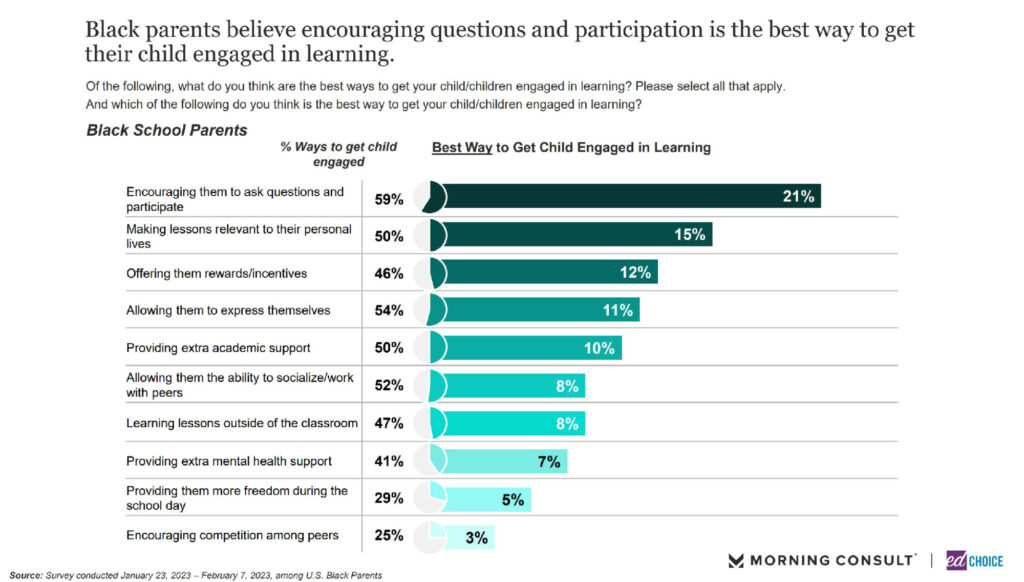
4. Black parents believe bullying is the most common obstacle their children face at school. When asked if their child has faced any difficulties at their school, nearly two-thirds of Black parents believe they have faced at least some difficulties at school. Bullying (24%), excessive stress or anxiety (19%), and difficulty with teachers (18%) were the difficulties Black parents reported most often. This data aligns similarly to what we observe in our general population polling.
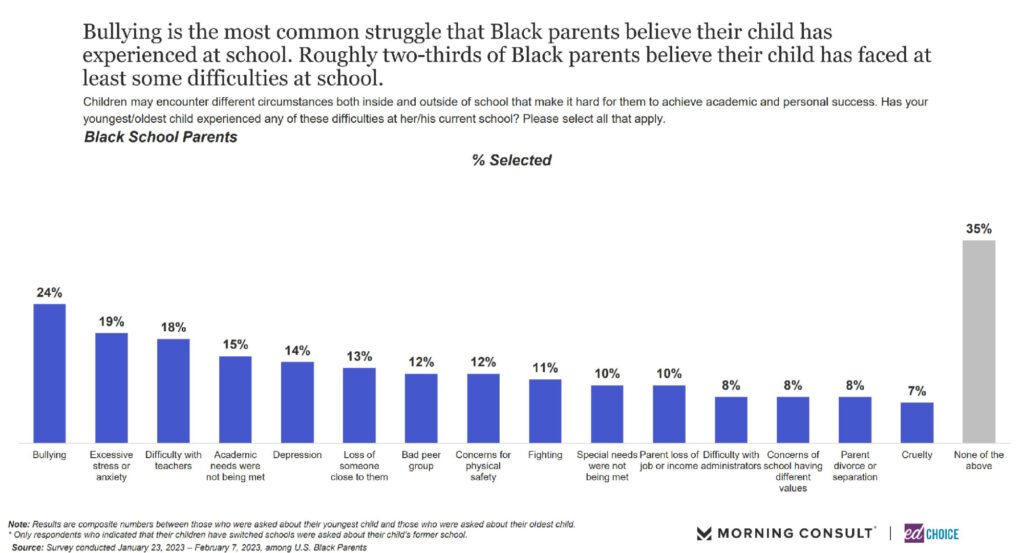
5. Almost one in ten Black parents have a child enrolled in a microschool. While 9 percent of Black parents reported their child being enrolled in a microschool, roughly half (49%) of Black parents said their child is not in a microschool but they are interested in learning more about microschools. The three groups most likely to have their child enrolled in a microschool were high income earners, parents from urban communities, and male parents. Results from this question in our general population polling yielded similar results. In our February general population survey, 10 percent of parents reported their child being enrolled in a microschool, just a tick higher than that of Black parents. Black parents, however, were more interested in learning about microschools (49%) than parents in our general population polling (37%).
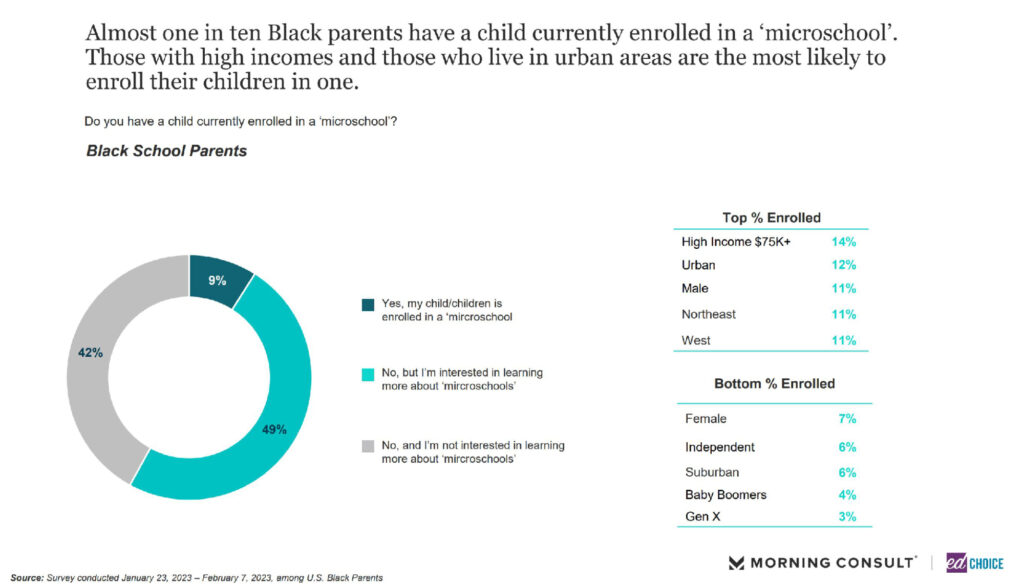
6. The majority of Black parents believe remote learning led them to be more involved in their child’s education as a result of the remote learning during the pandemic. More than two-thirds of Black parents (69%) feel they are more involved in their child’s education as a result of remote learning during the pandemic. Private school parents, high income earning parents, and special education parents were the most likely groups to indicate they have become more involved.
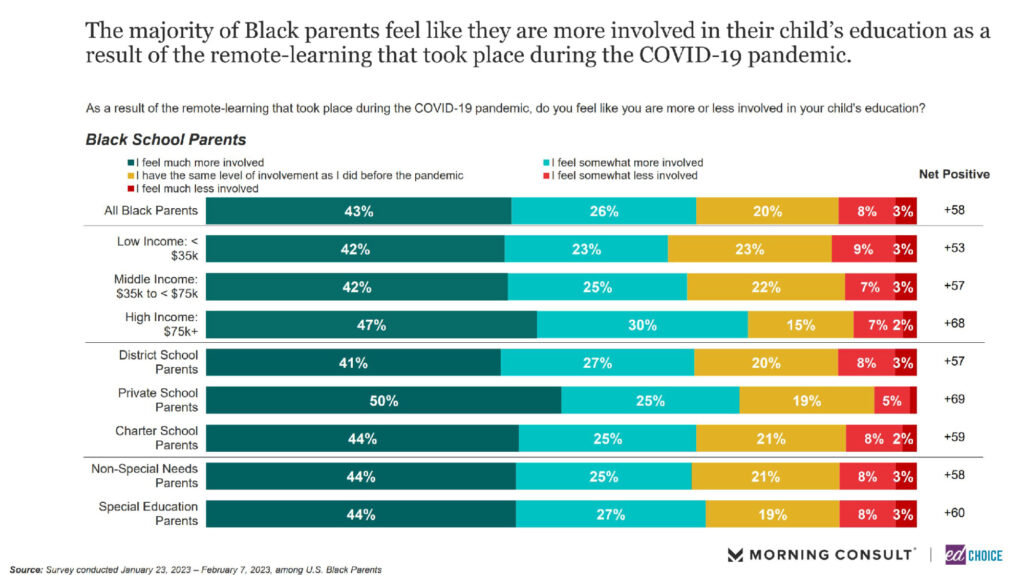
We also asked Black parents if their perception of their public school district changed as a result of the COVID-19 pandemic. More than two in five Black parents feel more positive about their public school district due to the pandemic, while less than one in five Black parents feel their perception of their public school district changed negatively.
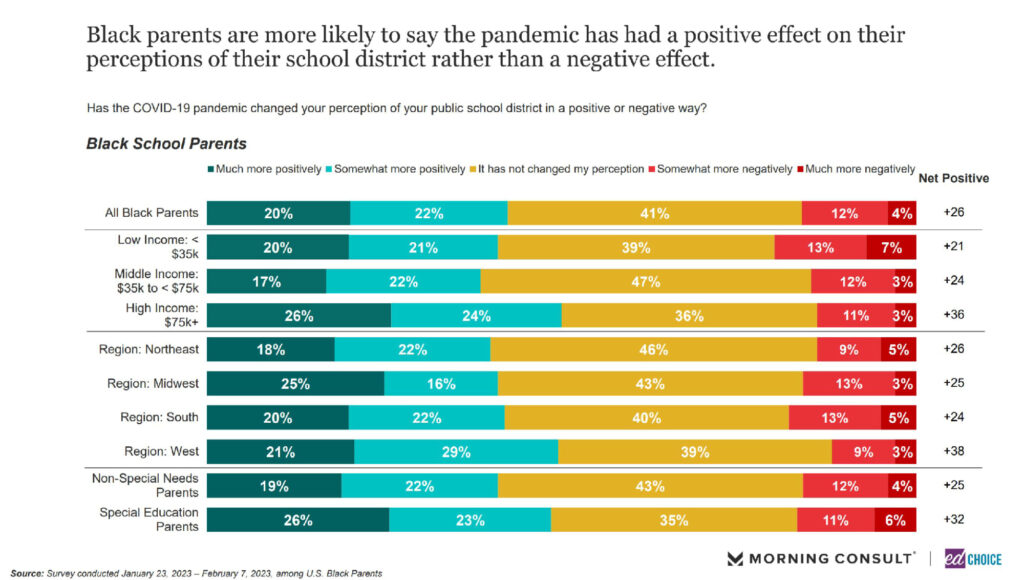
7. Only a quarter of Black parents believe education should stay the same as it is today. We asked Black parents whether they believe education should go back to how it was before the pandemic, stay the same as it is today, or change and go in a different direction. More than one-third of Black parents believe education needs to change and explore different directions (38%), while less than a quarter of Black parents believe education should stay the same (24%) or revert back to pre-pandemic practices (23%). Charter school parents were the most likely to push for change in the education, while high income earning parents were the most likely group to desire the education system remaining the same as it is today.
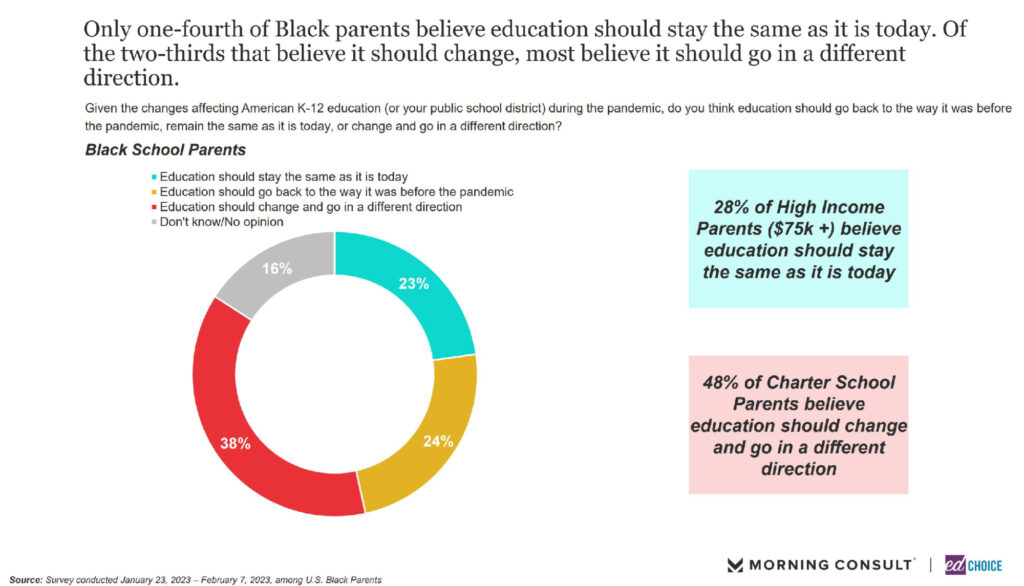
8. Support for school choice policies is high among Black parents. When a basic definition about each policy is provided, roughly three in four Black parents support education savings accounts (78%), vouchers (79%), charter schools (74%), and open enrollment (78%). Even without information about each policy being provided, the majority of Black parents support ESAs (57%), vouchers (62%), charter schools (68%), and open enrollment (66%).
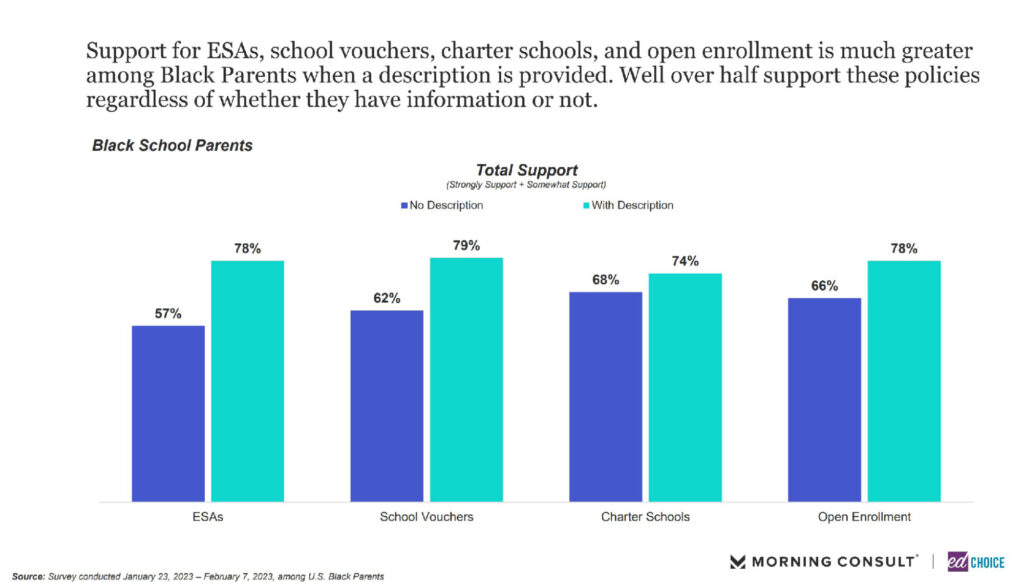
Awareness of school choice programs is another piece of the school choice puzzle. We asked Black parents if they are aware of ESAs, vouchers, charter schools, and open enrollment policies in their state. Black parents residing in states with school choice are more likely to be aware of such programs than in states without school choice. Additionally, Black parents exhibit higher awareness levels of school choice policies than school parents do in our general population polling.
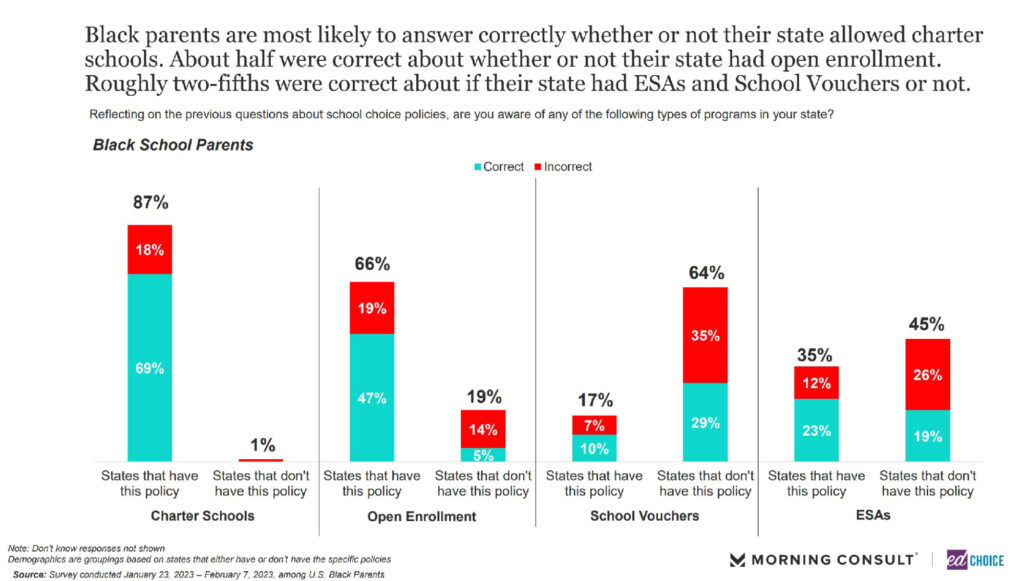
Lastly, we asked Black parents about the fairness and accessibility of the four school choice policies. The majority of Black parents feel ESAs (70%), vouchers (72%), charter schools (74%), and open enrollment (75%) are fair. Black parents are slightly less convinced about the accessibility of such policies, however. Roughly two-thirds of Black parents feel charter schools (69%) and open enrollment (64%) are accessible, while about half of Black parents feel ESAs (52%) and vouchers (52%) are accessible.
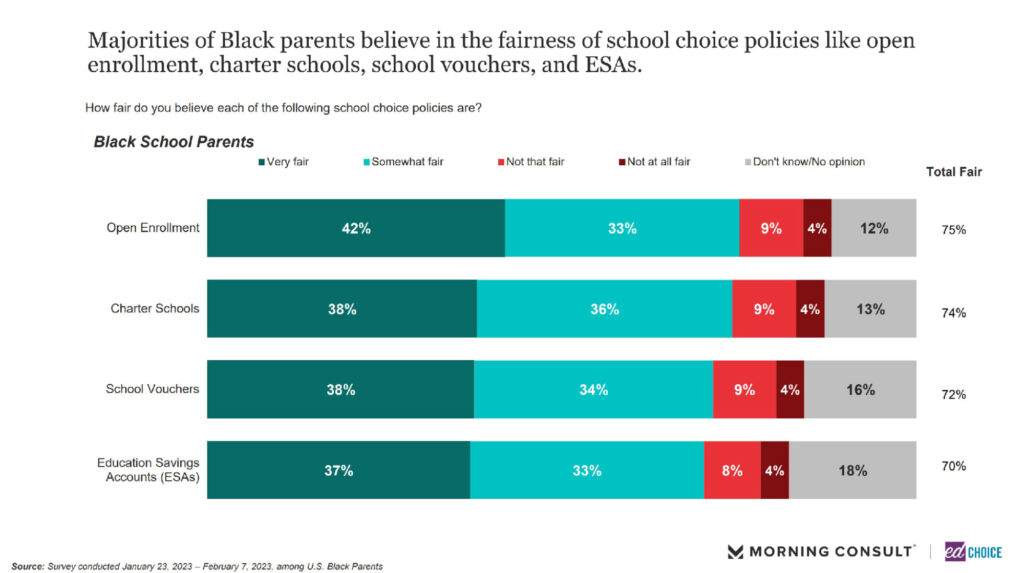
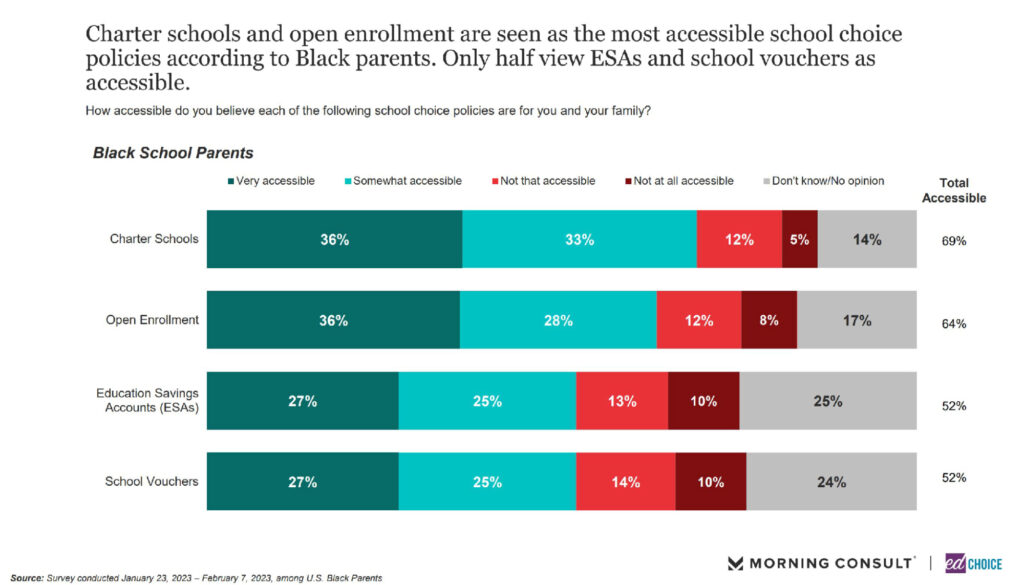
Visit the EdChoice Public Opinion Tracker site to access past reports, crosstabs, and questionnaires. We update our national and state dashboards every month. We also provide a more in-depth description of our research and survey methods.
Our K–12 education polls archive is updated on a rolling basis, roughly a few times each month. Please don’t hesitate to let us know if we are missing any surveys, or if there are accidental errors.




